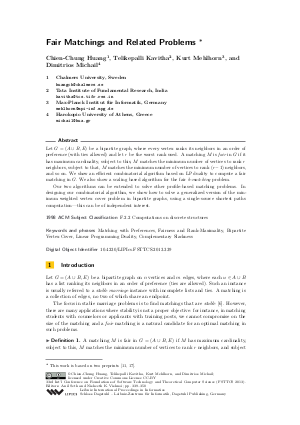Fair Matchings and Related Problems
Authors Chien-Chung Huang, Telikepalli Kavitha, Kurt Mehlhorn, Dimitrios Michail
-
Part of:
Volume:
IARCS Annual Conference on Foundations of Software Technology and Theoretical Computer Science (FSTTCS 2013)
Part of: Series: Leibniz International Proceedings in Informatics (LIPIcs)
Part of: Conference: IARCS Annual Conference on Foundations of Software Technology and Theoretical Computer Science (FSTTCS) - License:
 Creative Commons Attribution 3.0 Unported license
Creative Commons Attribution 3.0 Unported license
- Publication Date: 2013-12-10
File

PDF
LIPIcs.FSTTCS.2013.339.pdf
- Filesize: 0.51 MB
- 12 pages
Document Identifiers
Subject Classification
Keywords
- Matching with Preferences
- Fairness and Rank-Maximality
- Bipartite Vertex Cover
- Linear Programming Duality
- Complementary Slackness
Metrics
- Access Statistics
-
Total Accesses (updated on a weekly basis)
0Document
0Metadata
Abstract
Let G = (A union B, E) be a bipartite graph, where every vertex ranks its neighbors in an order of preference (with ties allowed) and let r be the worst rank used. A matching M is fair in G if it has maximum cardinality, subject to this, M matches the minimum number of vertices to rank r neighbors, subject to that, M matches the minimum number of vertices to rank (r-1) neighbors, and so on. We show an efficient combinatorial algorithm based on LP duality to compute a fair matching in G. We also show a scaling based algorithm for the fair b-matching problem. Our two algorithms can be extended to solve other profile-based matching problems. In designing our combinatorial algorithm, we show how to solve a generalized version of the minimum weighted vertex cover problem in bipartite graphs, using a single-source shortest paths computation---this can be of independent interest.
Cite As Get BibTex
Chien-Chung Huang, Telikepalli Kavitha, Kurt Mehlhorn, and Dimitrios Michail. Fair Matchings and Related Problems. In IARCS Annual Conference on Foundations of Software Technology and Theoretical Computer Science (FSTTCS 2013). Leibniz International Proceedings in Informatics (LIPIcs), Volume 24, pp. 339-350, Schloss Dagstuhl – Leibniz-Zentrum für Informatik (2013)
https://doi.org/10.4230/LIPIcs.FSTTCS.2013.339
BibTex
@InProceedings{huang_et_al:LIPIcs.FSTTCS.2013.339,
author = {Huang, Chien-Chung and Kavitha, Telikepalli and Mehlhorn, Kurt and Michail, Dimitrios},
title = {{Fair Matchings and Related Problems}},
booktitle = {IARCS Annual Conference on Foundations of Software Technology and Theoretical Computer Science (FSTTCS 2013)},
pages = {339--350},
series = {Leibniz International Proceedings in Informatics (LIPIcs)},
ISBN = {978-3-939897-64-4},
ISSN = {1868-8969},
year = {2013},
volume = {24},
editor = {Seth, Anil and Vishnoi, Nisheeth K.},
publisher = {Schloss Dagstuhl -- Leibniz-Zentrum f{\"u}r Informatik},
address = {Dagstuhl, Germany},
URL = {https://drops.dagstuhl.de/entities/document/10.4230/LIPIcs.FSTTCS.2013.339},
URN = {urn:nbn:de:0030-drops-43841},
doi = {10.4230/LIPIcs.FSTTCS.2013.339},
annote = {Keywords: Matching with Preferences, Fairness and Rank-Maximality, Bipartite Vertex Cover, Linear Programming Duality, Complementary Slackness}
}
